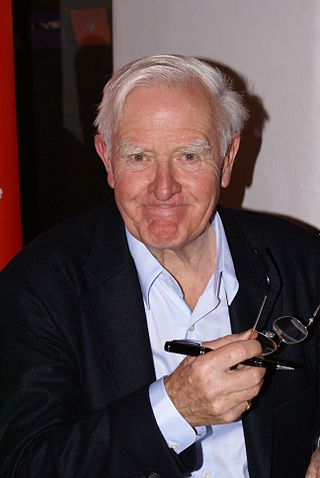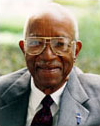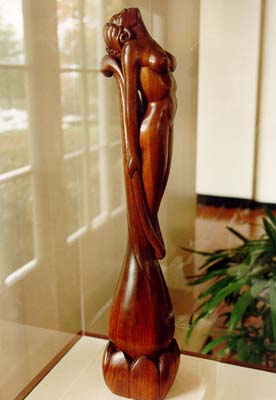Related Research Articles

John Ray Grisham Jr. is an American novelist, lawyer, and former member of the Mississippi House of Representatives, known for his best-selling legal thrillers. According to the American Academy of Achievement, Grisham has written 37 consecutive number-one fiction bestsellers, and his books have sold 300 million copies worldwide. Along with Tom Clancy and J. K. Rowling, Grisham is one of only three anglophone authors to have sold two million copies on the first printing.

David John Moore Cornwell, better known by his pen name John le Carré, was a British author, best known for his espionage novels, many of which were successfully adapted for film or television. A "sophisticated, morally ambiguous writer", he is considered one of the greatest novelists of the postwar era. During the 1950s and 1960s, he worked for both the Security Service (MI5) and the Secret Intelligence Service (MI6). Near the end of his life, le Carré became an Irish citizen.
This article contains information about the literary events and publications of 2002.

Edgar Lawrence Doctorow was an American novelist, editor, and professor, best known for his works of historical fiction.

Anthony Grove Hillerman was an American author of detective novels and nonfiction works, best known for his mystery novels featuring Navajo Nation Police officers Joe Leaphorn and Jim Chee. Several of his works have been adapted for film and television.
Alan Furst is an American author of historical spy novels. Furst has been called "an heir to the tradition of Eric Ambler and Graham Greene," whom he cites along with Joseph Roth and Arthur Koestler as important influences. Most of his novels since 1988 have been set just prior to or during the Second World War and he is noted for his successful evocations of Eastern European peoples and places during the period from 1933 to 1944.

David Gaub McCullough was an American popular historian. He was a two-time winner of both the Pulitzer Prize and the National Book Award. In 2006, he was given the Presidential Medal of Freedom, the United States' highest civilian award.

Ann Patchett is an American author. She received the 2002 PEN/Faulkner Award and the Orange Prize for Fiction in the same year, for her novel Bel Canto. Patchett's other novels include The Patron Saint of Liars (1992), Taft (1994), The Magician's Assistant (1997), Run (2007), State of Wonder (2011), Commonwealth (2016), The Dutch House (2019), and Tom Lake (2023). The Dutch House was a finalist for the 2020 Pulitzer Prize for Fiction.

John Hope Franklin was an American historian of the United States and former president of Phi Beta Kappa, the Organization of American Historians, the American Historical Association, and the Southern Historical Association. Franklin is best known for his work From Slavery to Freedom, first published in 1947, and continually updated. More than three million copies have been sold. In 1995, he was awarded the Presidential Medal of Freedom, the nation's highest civilian honor.
Steadman Upham was an American archaeologist and university administrator who served as president of Claremont Graduate University from 1998 to 2004 and the University of Tulsa (TU) from 2004 to 2016. Prior to this time, he was vice provost for research and dean of the Graduate School and professor of archaeology at the University of Oregon. Many of the students at TU fondly called him, "Uncle Stead." Upham was a widely published archaeologist, having written or edited 10 books and more than 75 book chapters and journal articles. He lectured extensively in the United States and Canada. While at TU, he held a concurrent appointment as professor in the Department of Anthropology.
KRMG is a commercial AM radio station in Tulsa, Oklahoma. The station is owned by Cox Media Group and airs a conservative news/talk radio format, simulcast with co-owned 102.3 KRMG-FM. The studios and offices are located on South Memorial Drive near Interstate 44 in Tulsa.

Gilcrease Museum, also known as the Thomas Gilcrease Institute of American History and Art, is a museum northwest of downtown Tulsa, Oklahoma housing the world's largest, most comprehensive collection of art of the American West, as well as a growing collection of art and artifacts from Central and South America. The museum is named for Thomas Gilcrease, an oil man and avid art collector, who began the collection. He deeded the collection, as well as the building and property, to the City of Tulsa in 1958. Since July 1, 2008, Gilcrease Museum has been managed by a public-private partnership of the City of Tulsa and the University of Tulsa. The Helmerich Center for American Research at Gilcrease Museum was added in 2014 at a cost of $14 million to provide a secure archival area where researchers can access any of the more than 100,000 books, documents, maps and unpublished materials that have been acquired by the museum.

William Bernhardt is an American thriller/mystery/suspense fiction author best known for his "Ben Kincaid" series of books.
John Steven Wooley is an American writer, novelist, historian, lecturer, filmmaker, and radio and TV host who specializes in the movies, literature, and music of the 1930s and ‘40s as well as other pop-culture histories.

Willard Stone was an American artist best known for his wood sculptures carved in a flowing Art Deco style.
The Tulsa City-County Library (TCCL) is the major public library system in Tulsa County, Oklahoma.

Peggy Dow is an American philanthropist and former actress who had a brief (1949–52) career in Hollywood at Universal Studios starring in films during the Golden Age Era in the late 1940s and early 1950s. She is perhaps best known for her roles as Nurse Kelly in Harvey (1950) and Judy Greene in Bright Victory (1951).
Voices of Oklahoma (VOk) is an online oral history project dedicated to the preservation of the history of Oklahoma and its people. The oral histories are archived at www.voicesofoklahoma.com for educators, students, and the general public to access for research and study. First-person accounts include a wide range of subjects including ranching, politics, education, business, music and arts, and much more. VOk hopes young people will draw knowledge which may guide and shape their future. The mission statement for Voices of Oklahoma is to preserve Oklahoma’s legacy, one voice at a time.

Teresa Miller is an American writer, television host, and literary activist. She resides in Tulsa, where she works as full-time writer.
References
- ↑ Althea Peterson, "Brooks to receive Helmerich Award", Tulsa World, February 18, 2009.
- ↑ "Spangled banner's new star", Sydney Morning Herald , March 23, 2007 (retrieved May 24, 2009).
- ↑ Tom Droege, "Author makes snowy trek for Helmerich award", Tulsa World , December 3, 2006.
- 1 2 Peggy V. Helmerich Distinguished Author Award: History of the Award (retrieved May 22, 2009).
- 1 2 Peggy V. Helmerich Distinguished Author Award: Award Winners (retrieved May 22, 2009).
- ↑ Oklahoma Library Legends: Peggy Helmerich Archived 2009-01-05 at the Wayback Machine at Oklahoma State University library website (retrieved May 23, 2009).
- ↑ Henry G. Bennett Distinguished Service Award: Peggy V. and W. H. Helmerich III at Oklahoma State University library website (retrieved May 23, 2009).
- ↑ "Helmerich Family Leaves Fascinating Legacy", GTR Newspapers, July 6, 2007 (retrieved May 23, 2009).
- ↑ Cathy Logan, "Tulsa's Peggy Dow Knew Him When", Tulsa World , July 3, 1997.
- ↑ Leslie Halliwell, John Walker, Halliwell's Who's Who in the Movies (HarperCollins, 2003), ISBN 978-0-06-053423-3, p. 142 (excerpt available at Google Books).
- ↑ Michael Overall, "City's `Favorite Son'", Tulsa World , December 6, 1997.
- ↑ Michael Overall, "Franklin Tells of Life in Early Tulsa", Tulsa World , December 7, 1997.
- ↑ Danna Sue Walker, "Black History First Learned, Then Taught", Tulsa World , December 8, 1997.
- ↑ "Arthur Miller rewarded for distinctive work", AP at USA Today , April 26, 2004.
- ↑ "Arthur Miller declines award because of illness", Tulsa World , November 6, 2004
- ↑ "$25,000 returned to library", Tulsa World , January 5, 2005.
- ↑ "Arthur Miller, playwright of 'Death of a Salesman,' dies at 89", Tulsa World , February 12, 2005.
- ↑ "Author Grisham to receive 2005 Helmerich award", Tulsa World , November 13, 2005.
- ↑ "Acclaimed author Tony Hillerman dies at 83", Tulsa World , October 27, 2008.
- ↑ "Grisham Wins Tulsa City-County Library Literary Award" Archived 2011-06-07 at the Wayback Machine , Library Journal , January 4, 2006.
- ↑ "4BetterOrWorse - The week in review", The Hook , December 1, 2005.
- 1 2 James D. Watts, Jr., "Novelist Richard Ford wins 2017 Helmerich Award", Tulsa World , April 30, 2017.
- ↑ Paul Galloway, "In From The Cold: John Le Carre Faces The Future With A Polished Public Presence", Chicago Tribune , December 21, 1990. ("You wouldn`t expect to find John le Carre in this beautiful city of almost 400,000 in the verdant hills of eastern Oklahoma. But on a December weekend, there he was, tall, patrician, witty, an engaging raconteur, utterly British, sampling the house specialty from a local chili parlor, dining on barbecued ribs, baked beans and other regional delicacies at a country club luncheon, visiting a museum that features art from the American West, addressing a black-tie dinner, and giving a public lecture at the Tulsa City-County Library.")
- ↑ Althea Peterson, "2009 Helmerich award winner has unusual past" Archived 2012-10-07 at the Wayback Machine , Tulsa World, February 19, 2009.
- ↑ James D. Watts, Jr, "Ian McEwan Wins Helmerich Award", Tulsa World, March 2, 2010.
- ↑ David Harper, "Spy novelist Alan Furst chosen for 2011 Helmerich Award", Tulsa World , March 6, 2011.
- ↑ "Meet Wendell Berry, Winner of the 2012 Peggy V. Helmerich Distinguished Author Award", StudioTulsa, KWGS, December 5, 2012 (includes audio interview).
- ↑ James D. Watt, Jr., "Novelist to receive 2013 Helmerich award", Tulsa World , March 24, 2013.
- ↑ James D. Watts, Jr., "Ann Patchett is 2014 Peggy V. Helmerich Distinguished Author Award recipient", Tulsa World , March 30, 2014.
- ↑ "A Conversation with Rick Atkinson, Winner of the 2015 Peggy V. Helmerich Distinguished Author Award", KWGS, December 3, 2015.
- ↑ James D. Watts, Jr., "Poet Billy Collins wins 2016 Helmerich Award", Tulsa World , April 11, 2016.
- ↑ "2018 Peggy V. Helmerich Distinguished Author Award | Tulsa Library |". www.tulsalibrary.org.
- ↑ "2019 Peggy V. Helmerich Distinguished Author Award", Tulsa City-County Library.